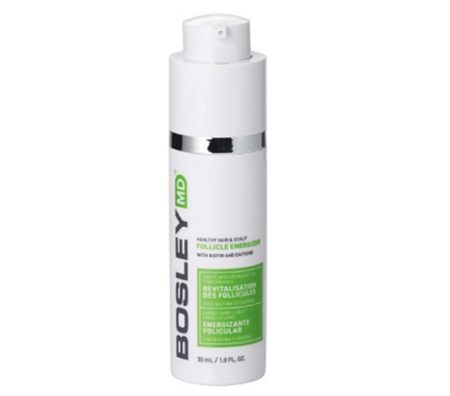Losing Lots of Hair Right Now? You’re Not Alone

Out of all the beauty topics in the world, one of the most challenging to talk about is hair loss. And more specifically, hair loss experienced by women. While it’s something that the greater population usually plops into the “men’s issues” bucket, the reality is that hair loss is a common issue for all people.
Today we’re talking about a specific type of temporary hair loss referred to as “telogen effluvium.” It’s triggered by a major mental shift or physical change, which includes things like pregnancy, illness, and even severe stress. On that note, the COVID-19 pandemic has led to an increase in telogen effluvium cases around the globe.
For some, the hair loss is triggered by catching the virus and becoming sick, and for others, it’s simply caused by the increase in stress regarding all these life changes. So, if you’ve noticed more strands in your hairbrush or the shower drain lately, you’re not alone.
With expert help, we’re diving into what telogen effluvium is, the correlation between COVID and this form of hair loss, and how to tell if you’re experiencing it. We’re also walking you through the steps for what to do if you think you’re experiencing this form of hair loss.
A Closer Look At Telogen Effluvium
 via Giphy
via Giphy
As mentioned above, telogen effluvium is a form of temporary hair loss that’s often triggered by either a major mental or physical event. That could be a pregnancy, surgery, illness, extreme weight loss (or gain), or physical trauma. Mentally, that might include the death of a loved one, divorce, a relocation, being overworked, or losing your job. Dealing with a freaking pandemic totally counts, too.
“Many people right now are having extra stresses: money concerns, not being able to see loved ones, and homeschooling are some of the biggest issues we are facing today,” says Gretchen Friese, a certified trichologist for BosleyMD. “Any one of these can cause extra stress to the body – and some people are experiencing all of them.”
So, what exactly is happening, physiologically, to cause this hair loss? In short, Friese says there’s a reduction in the number of hair follicles that are growing hair. Generally, about 30% of your follicles shut down.
“This is because the ‘shock’ of the environmental change causes the hair follicles to go into a resting state,” she explains. “When hair follicles are in a resting state, more dormant follicles will be present, and the hair won’t grow as it normally would.”
Basically: some of your hair follicles are like, “Wait up. There’s a LOT going on right now, sooo I’m gonna peace out until things calm down. BRB.” This pause in growth can happen immediately, or it might take a couple of months for your body to realize there’s mayhem before pressing pause. For some, they don’t experience (or notice) the loss until months later.
That was the case for Shelly Stafford, a woman in her mid-30s living in Vancouver, Washington. She tells us that she’s always had fine, thin hair, but that she noticed hair loss in the midst of a stressful, abusive relationship that lasted from age 17 to 24.
“Around 22, I started noticing more hair in my hairbrush and a widening part. Even combing my fingers through my hair would result in several strands tangling themselves with my fingers,” she says. “My genetics did not help, but it was the stress of the abuse in the relationship that really knocked it out of the park.”
Posts You'll Love:
Signs You Have Telogen Effluvium
It can be hard to notice hair loss until you’ve reached the more severe stages, but there are some signs to look for. As Stafford mentioned above, extra hair in your hairbrush is one sign, as is a widening part.
You might also notice an uptick of hair in the shower drain, excess strands on your fingers when you run your fingers through your hair, or more strands on your clothing/around the house compared to usual. Over time, you might also start to see a change in the amount of hair on your head.
Do note that losing hair every day is normal. Generally speaking, it’s normal to lose between 50 and 100 hairs every single day. There are some periods of time when you might lose a little more than usual (like around your period); this sort of fluctuation is also normal. It’s a major, noticeable, ongoing change in the amount of hair you’re losing that could be a sign of telogen effluvium.
How to Treat Telogen Effluvium

Here’s the good news about this type of hair loss: it’s temporary. In fact, it usually lasts for about six months. In that sense, patience and not allowing yourself to stress further are key in fostering that recovery. There are a few other steps you can take, as well.
Step number one is to identify what the cause is and address it. If you know it is stress-related, make it a priority to get that stress under control. (We know, it’s easier said than done. However, it’s still a good goal to shoot for – and for reasons that go beyond your hair.) If it’s a situation you’re in and you can remove yourself, do so. Maybe that means asking for help at work, leaning on friends during a major life change, or leaving an abusive relationship entirely – read helpguide.org’a guide for how to get out of an abusive relationship here.
As for COVID, we know it’s an inescapable reality right now, but you can still do things that help reduce the mental load. Throw yourself into fulfilling hobbies – like indoor gardening, reading, or crafting. You can also speak with someone who can help you work through the stress the pandemic has caused you.
If you’ve pinpointed the cause and have begun working to remedy it, consider bringing in treatments.
“I recommend using products and taking supplements to help alleviate loss and regrow hair. For example, BosleyMD has a product called Healthy Hair & Scalp Follicle Energizer, $30, that will ‘wake up’ those dormant follicles and regrow hair,” says Friese.
 Source: Bosley
Source: Bosley
You can also take supplements that target hair health. Nutrafol, $88, is an excellent option, as is the Viviscal Hair Growth Dietary Supplement, $34. Note that all supplements should be paired with a healthy, balanced diet.
 Source: Viviscal, Nutrafol
Source: Viviscal, Nutrafol
“In the case that an individual isn’t sure what is causing excessive hair loss, I recommend seeing a doctor to make sure there aren’t any underlying medical concerns,” notes Friese. You should also speak with a doctor if your hair loss has surpassed the six-month mark. Your doctor may prescribe minoxidil, a powerful, topical product that stimulates hair growth (it’s the key ingredient in Rogaine).
Wherever you’re at on your hair journey, know that you are not alone and that you have options. Be good to yourself along the way and seek help when necessary.
Disclaimer: Every product we review has been independently selected and tested without bias by our editorial team. We never take payment to review products, however, some brands allow affiliate links, so we may earn a commission if you purchase a product by clicking on one of our links.























Leave a comment